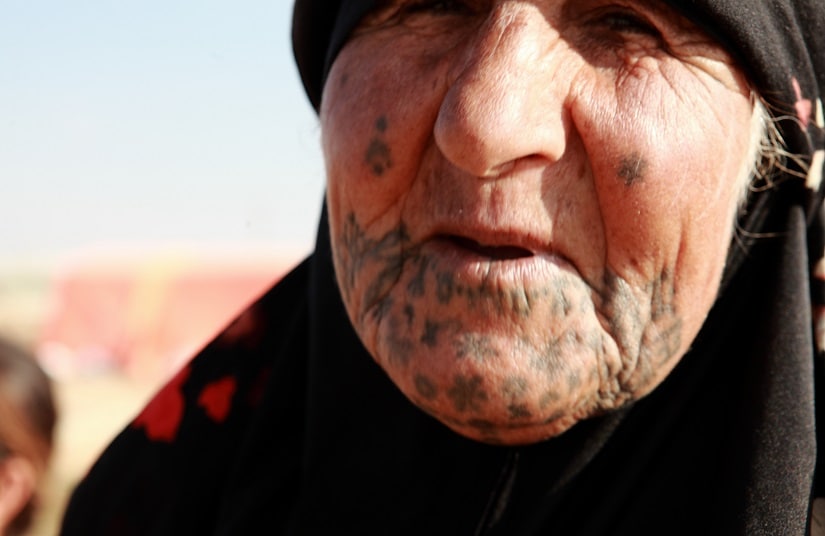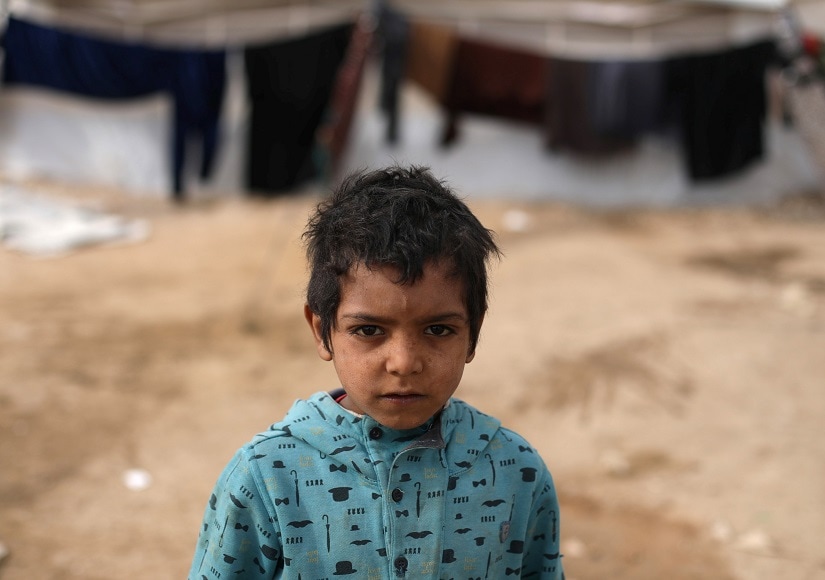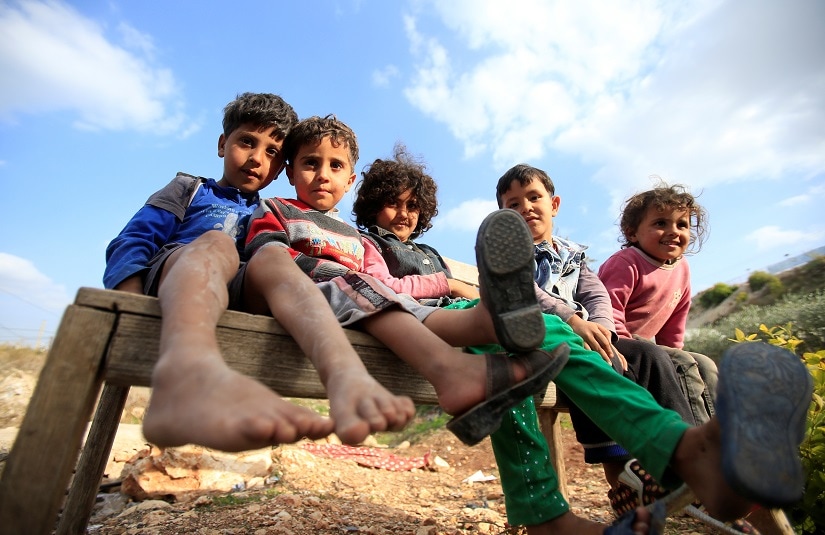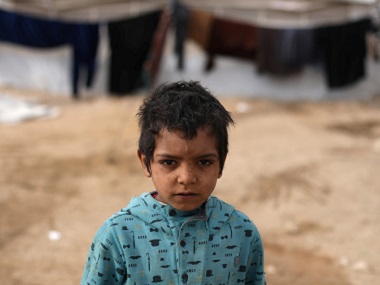(Editor’s note: This is the second in a two-part series on the plight of Syrian refugees in a Jordanian camp. Read part one here .) Every day, scores of people — mostly from Asian countries — reach Amman to visit some of the World Heritage sites, including Petra, where Bollywood stars Harrison Ford and Sean Connery shot Indiana Jones and the Last Crusade_._ And then, the tourists, led by flag-totting guides herding them in a group, travel in air-conditioned vehicles to see for themselves the plight of thousands of Syrian refugees languishing in the deserts close to the Syria-Jordan borders. Soldiers from the Jordan Army keep a close watch on the tourists, who take the help of bilingual speakers to interact with the hapless refugees. Many take selfies, some pose with children, some even ask the refugees if they could adopt some of their newborns. Arna Mustafa, 72, a grandmother, was called repeatedly by the tourists, mostly from China, Japan and other Asian countries, for selfies because she had tattoos on her chin. “They come all the time, asking if we would part with our children. They are keen on newborns, one or two-year-olds. They claim they have valid papers,” says Mustafa. She sits on a carpet outside her tent, covering her face with a silk scarf as sand swirls around the area. [caption id=“attachment_4273329” align=“alignnone” width=“825”]  Arna Mustafa. Photo courtesy Filippo Sbalchiero/IAHV[/caption] But it is easier said than done; Jordanian rules prohibit adoptions at these camps because not all of the 80,000 plus refugees have turned into Jordan nationals. There are many Syrian nationals and there are high chances they could return home when hostilities end — though when that will be, is a million dollar question. Mustafa says the refugees do not like to be photographed, both inside and outside the makeshift camps. But the tourists rarely listen. Local police officers do little to stop the tourists from running amok; photography is banned only in camps with high walls and barbed wire fences. “We are in the open, we feel happy at the presence of any visitors because they bring food and fruits. And then they take photographs,” says Khalid Satuf Mustafa, a father of six. Mustafa says he had to repeatedly narrate to the tourists how he lost his wife when a bullet hit her while she was gardening in the backyard of their home at Bosra al-Sham, located near the Jordanian border, known for its historic citadel, ruins and well-preserved Roman theatre. Every time he talked about life before the war to the tourists, he reminded them that he lived in a place that was once the capital of the Roman province of Arabia and a stopover on caravan routes to Mecca. Inside his tent, an aid worker attends to his two coughing children. Mustafa says he has been approached umpteen times by foreign tourists if he would like to give up his sons for adoption. “Initially, I didn’t understand, then I got angry,” says Mustafa. Standing close, members of the Jordanian police do not allow the tourists to spend more than an hour at the camp. They are careful not to deter the tourists and intervene every time the refugees lose patience. Tourism, which contributed nearly 6 percent directly and 20 percent indirectly to Jordan’s GDP took a hit after the Islamic State-led attack near a refugee camp last year. Now, the government welcomes anyone willing to risk a tour to Jordan. “Everyone wants to see how refugees live, many even demand they should be taken across the border to see devastation. Not many are keen to hear about Indiana Jones and the filming in 1989,” says Mohammad Nawras, a travel agent. He says the outbreak of Syria’s civil war in 2011 triggered an 80 percent drop in tourists to Jordan. Now, those visiting Jordan are keener to see the aftermath of a bloody war, not World Heritage Sites like Petra. Experts say dark tourism is growing because travellers want to show to their relatives and friends that they went to sites of disaster. Many lie that they worked as volunteers with the homeless. The numbers have swelled because the travellers know attacks are being staged everywhere from Berlin to Paris. “In some countries, new buildings with fresh coat of paints come up fast, you cannot make out it was once a place of disaster. Not here, with the refugees, the tents and tanks at the borders. It all adds up to some riveting conversations back home,” says Sahar Al Umar, a guide. [caption id=“attachment_4273333” align=“alignnone” width=“825”]  A Syrian boy pictured at a refugee camp. REUTERS[/caption] [caption id=“attachment_4273335” align=“alignnone” width=“825”]  Syrian refugee children sit together. REUTERS[/caption] He says there are other critical elements of such dark tourism, particularly around the behaviour of tourists while at the sites. “Many smile while taking selfies with refugees,” adds Al Umar. Seasoned tour operator D Chatterjee says people have taken to dark tourism and continue to visit places of strife. “We only warn them but eventually help them with visas because they do not have the Islamophobia that many in the West do, which makes them wary of travelling to such violence-prone places. Asian tourists are different. They want picture postcards from strife-torn regions.” So what exactly is disaster tourism, or dark tourism, and does it always flourish in places of devastation? Noemi De Luca, executive director of the Institute for Dark Tourism Research, based at the University of Central Lancashire, England, has been studying the subject for a decade now. “Many want to see how people coped with the crisis, some want to see destruction. Dark tourism is always laced with political and historical significance,” De Luca said in a television interview at the University of Central Lancashire. The professor said it would be wrong to say disaster tourism is all about selfies, as it enlightens travellers to understand how societies deal with death and destruction. “It helps many understand how people, societies deal with such devastation,” De Luca told the University news channel. Tourists rushing to Jordan to get close to the refugees is not a disturbing trend, said De Luca. But still, it does not justify tourists landing up at refugee camps and checking out Syrian orphans, says Fatima Al-Manaser, head of the SOS Children’s Village in Amman. “It is not just here tourists are landing up, they are going all over the world to see violence, see death. I do not know why.” Operators say they organise tours for dark destinations like the Auschwitz concentration camp where tourists learn about the atrocities carried out by the Nazis during World War II; some even travel to the areas affected by the nuclear disaster in Fukushima and the Hiroshima Peace Park, or Ground Zero, a memorial for the 9/11 attacks in New York. “That’s a lot of history you read in your school books; what you see in Syria, Afghanistan, and Iraq is brutalities… you are actually close to war-torn areas,” says Al-Manaser. She remembers how a Russian travel company was planning to launch holiday tours to war-torn Syria in 2017, with a focus on the front line of the country’s bloody civil war. But the travel agency, Megapolis Kurort, was denied permission by the Russian government. “But such tours to the refugee camps will continue, however sad it may be and there will continue to be lack of respect towards the refugees,” says Al-Manaser. Dom Joly, an English television comedian and journalist, writes in his book, The Dark Tourist, that he had always been fascinated by such off-the-beaten-track destinations like Iran, Iraq, Afghanistan, Chernobyl and North Korea. Joly’s childhood was spent in war-torn Lebanon where he collected shrapnel instead of marbles, spent terrifying days and nights in a basement under Syrian rocket attack. And now, many (Asians) are trying to do the same: selfies with distraught refugees, portraits near the rubble of what was once a happy home.
‘Dark tourism’ – driven mainly by Asians – is on the upswing at Syrian refugee camps along the Jordan border
Advertisement
End of Article


)




